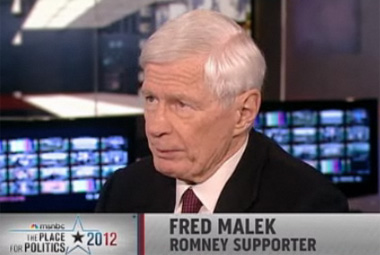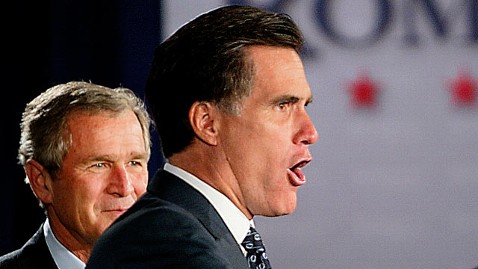More reasons for Mitt Romney to release tax returns, or maybe another reason why he hasn’t released his tax returns
Ties with Team Bush, part 1

Bush endorsing Romney
To be clear, the foremost reason why a candidate for the White House should release financial records is principle. The public has a right to know of any encumbrances and influences borne by someone running for the presidency, and for a presidential candidate, especially a major candidate, to dismiss or to downplay this principle is unworthy.
Descending swiftly to less exalted planes of argument, it should be apparent by now that there are also political reasons for presumptive-GOP nominee Mitt Romney to release his income tax returns. He seems to be concealing something, and even aside from the principle enunciated above it’s making him look bad. Admittedly the widespread buzz about Romney’s secretiveness may be playing into the hands of the Romney campaign. Possibly the campaign has made a tactical decision to refuse to release the IRS returns right up to the point when it about-faces and releases them, showing once and for all that there’s nothing there.

Romney, spoofed
In the meantime, however, that possibility has done nothing to deter speculation about Romney’s paper trail or financial track record. Time and space preclude an exhaustive list of speculations voiced so far about what Romney might be hiding, but here are a few:
- Did Romney pay no income tax at all some years, despite his wealth? Raised in January, this possibility has also been discussed in Bloomberg News and in the Washington Post, among other outlets.
- Are Romney’s effective tax rates just embarrassingly low, compared to the taxes much poorer people pay in the United States? Think Progress discussed this one early, followed by other outlets including money.cnn.com and The Daily Beast.
- Would his IRS returns reveal more about Romney’s embarrassing offshore accounts and assets? The newest issue of Vanity Fair has more on this.
- Then there is the overlapping issue of tax havens and tax shelters, wherever they may be. Has Romney been even more closely associated with them than the public has yet been made aware?
- Are there more discrepancies in Romney’s own bookkeeping, as between his IRS filings and his company’s SEC filings, or between his records and his public statements?
Here is another question.
A plethora of SEC filings and other sources indicate that Romney and his cronies in the business community, including Marriott, helped GWBush and the Bush team over the years. As has been noted elsewhere, in this eloquent piece by Joe Conason for example, the Bush administration and Team Bush are not looking good in electoral politics in 2012. It is politically understandable that Romney wouldn’t want to be linked with the Bush image. But even a quick overview of George W. Bush’s track record in business corroborates Ralph Nader’s comment in 2000 that George Bush was “a group of corporations running as a man,” and prominent among those corporations was Marriott–closely tied to Romney, Romney’s family, and Romney’s companies. Marriott ties not only gave Mitt Romney his first name (after the Willard in Marriott) but also gave Dubya his business career.
An early Carlyle Group acquisition
The Marriott clan’s ties to the Romney team, past and present, are too extensive and too well reported to need belaboring here. Romney-Marriott closeness is a political and financial given. That Marriott enterprises also provided George W. Bush the platform for his business career has not been widely reported–none of the major media outlets touched it, or thoroughly vetted Bush’s business career, in 2000–although I sketched part of the story in 2004. One minor entity was an unsuccessful airline food company named Caterair International Corporation, a spin-off from Marriott Corporation, which founded the airline-food industry in the thirties. As written previously, CaterAir was started in 1989 by a private investors group including Bush supporters Daniel J. Altobello and Frederic V. Malek, who then brought Bush on. George W. Bush became a director at CaterAir officially in 1990, the company got an additional boost from the Carlyle Group, where George H. W. Bush came on board after leaving the White House in 1992, and Bush left in 1994 to run for Governor of Texas.

Former Texas Gov. Ann Richards
Romney-Bush family ties in Virginia
Coleman Andrews, second from left
The Marriott company or cluster of interests, however, is not the only Romney-Bush link. If we really want to know more about ties between Romney interests and Bush interests over the years, we can cut out the Marriott middleman and go straight to, among others, T. Coleman Andrews III, co-founding partner of Bain Capital and brother of Scott Andrews, who co-founded the investment firm Winston Partners with George W. Bush’s youngest brother, Marvin Bush. The family ties in politics and finance run deep. The Andrews’ late grandfather, Thomas Coleman Andrews, a founder of the John Birch Society, resigned from his position as IRS commissioner under Eisenhower. Scott Andrews served as an executive in two air transport companies, Presidential Airways and World Corp–where Coleman Andrews was chair. Both went bankrupt; Coleman Andrews left WorldCorp in 1998. A brother-in-law of Jack Kemp, he also became CEO of South African Airways.
Side note: Called in by Nelson Mandela as a consultant for South African Airways, Coleman Andrews reportedly spent hundreds of millions on consultants including Bain Capital. Andrews himself left SAA in 2001 with a golden parachute reported at $14 million. There is no indication at this time that the Romney campaign plans to include a stop in South Africa for one of its international fundraisers.
Space precludes an extensive history of WorldCorp here. Suffice it to say that Bain Capital and Bain alumni, or directors and officers, were all over the company and its bankruptcy, as shown here and here and here among numerous documents. WorldCorp and Bain were all over the problems at South African Airways, as noted. They were thick on the ground in the bankruptcy of World Airways–owned by WorldCorp and headed by Coleman Andrews–which also purchased consulting from Bain Capital. They were also extensively connected with a series of mergers and buy-outs through which a lesser known company called US Order became part of ever larger financial services firms. For example, see this SEC filing dating from the 2005 merger of InteliData and Corillian Corporation. InteliData, with Bain alum John Backus on board, became Coriallian; Corillian bought CheckFree, now FISERV.
“ Patrick F. Graham, age 65, has served as a director of InteliData since 1996 and was a director of US Order, Inc. from 1993 until US Order and Colonial Data Technologies Corp. merged to form InteliData in November 1996. Since October 2001, he has been the Vice President of Business Development and Strategic Projects for The Gillette Company, a consumer products marketer of personal care and personal use products. From July 1999 until October 2001, he was the Director of the Global Strategy Practice of A.T. Kearney, Inc., a management consulting firm. From 1997 until June 1999, he served as Chief Executive Officer of WorldCorp, Inc. On February 12, 1999, WorldCorp, Inc. filed a voluntary petition and a proposed plan of reorganization under Chapter 11 of the United States Bankruptcy Code with the United States Bankruptcy Court for the district of Delaware. He was previously a director of Bain & Company, Inc., a management consulting firm Mr. Graham co-founded in 1973. In addition to his primary responsibilities with Bain clients, he served as Bain’s Vice Chairman and Chief Financial Officer. Prior to founding Bain, Mr. Graham was a group Vice President with the Boston Consulting Group. Mr. Graham is also a director of Stericycle, Inc., a provider of medical waste services and OSHA compliance services.”
A co-founder of Bain, Graham served on the board of InteliData with an alumna of CaterAir and as stated another alumnus of Bain Capital as well as of US Order. The ties extend farther. This SEC filing from World Air Holdings, the holding company of World Airways and WorldCorp, lists as directors John Backus, A. Scott Andrews and Daniel J. Altobello. Again, sponsors of Bush family interests and of George W. Bush, respectively, in the realms of finance and of politics have been working hand in corporate glove for years with Romney cronies and partners. This is no far-fetched, diffuse, stretched set of associations; it’s partners and relatives with longstanding political and financial ties, serving in the same boardrooms–boardrooms, be it noted, that were key in some spectacular bankruptcies and other failures at a considerable human cost. Furthermore, the ties extend to some political views that are considered weird by any reasonable criterion.
It’s that simple.
Romney’s reluctance to release his detailed IRS records is not mystifying. It will be a little mystifying if he gets away with not doing so.



